The key to success in business is to find a niche and master it. Read this guide to discover 20 niches, and why they work.
Key takeaways
- Successful businesses start by dominating a specific niche before expanding into broader markets.
- Niche markets enable precise targeting and differentiated products that stand out against generic competitors.
- Solving a specific pain point for an underserved audience creates loyal customers willing to pay premium prices.
Success in business comes down to a lot of things, but for many companies, picking the right niche has been what gave them the perfect start. Almost every good business starts small, targeting a small group of consumers and solving a very particular set of problems, and becomes an authoritative name in that market before expanding into others.
We’re going to look at 20 companies of niche markets that different businesses have entered successfully, and show you why they were able to establish themselves as they did. By the end of it, we’re hoping to give you the inspiration as well as the information you need to find your niche and start a business today!
What is a niche market?
A niche market is a smaller, defined and distinct part of a larger market that is set apart by a particular characteristic or quality that may not apply to the broader segment. So, for instance, the car market has a large number of niches such as electric, city, four-wheel drive, and so on.
In fact, that example barely brushes the surface even though it does highlight how different niches might stand out in a broader market segment. It’s possible to identify niches using a variety of approaches, including:
- Demographic. These are factors such as age, gender, and education level that can dictate the development of niches—especially age and gender, which leads to a lot of variation and consumer preference.
- Geographic. Things can also differ for different geographical reasons, such as temperature, weather, length of seasons and so on.
- Psychographic. The values, attitudes, and interests of consumers can create a vast variety of niches within a broader market.
- Behavioral. The behavior of consumers can also end up in the creation of various interesting niches that businesses can exploit.
- Price. Price is an extremely common factor, with just about every market featuring segmentation and niche-formation based on price.
- Quality. Much like price, quality often ends up creating many niches, and may in fact be trending towards even more prominence as traditionally high-quality brands sacrifice quality in favor of cost—thus opening up space for new, higher-quality products to overtake them.
Why is it important to focus on a niche?
Niches are extremely important in any sort of business because it allows you to sell to a certain set of customers in the most precise, efficient way possible. If you go into business with too wide a remit, you’ll find yourself stretched thin far too quickly, and your products will struggle to stand out because of how generic they are.
Conquering a broader market is a realistic goal for bigger, more established companies who have already dominated their niches, but for most companies, success is found in mastering a single niche.
Imagine trying to sell shoes—the broader shoe market is massive, and impossible to take on at once. On the other hand, drilling down into a specific niche is far more feasible—say, premium dress shoes for men. That’s much more manageable, since you can focus on a certain set of styles, materials, colors, and even customers.
Narrowing down even further might even help, like selling premium dress shoes for younger men. You can make a name for yourself like this, and also be able to sell to your customers much more effectively via tools like target personas.
20 businesses that triumphed with a niche market
1. Chewy (niche market: cheap, high-quality pet food for time-strapped pet owners)
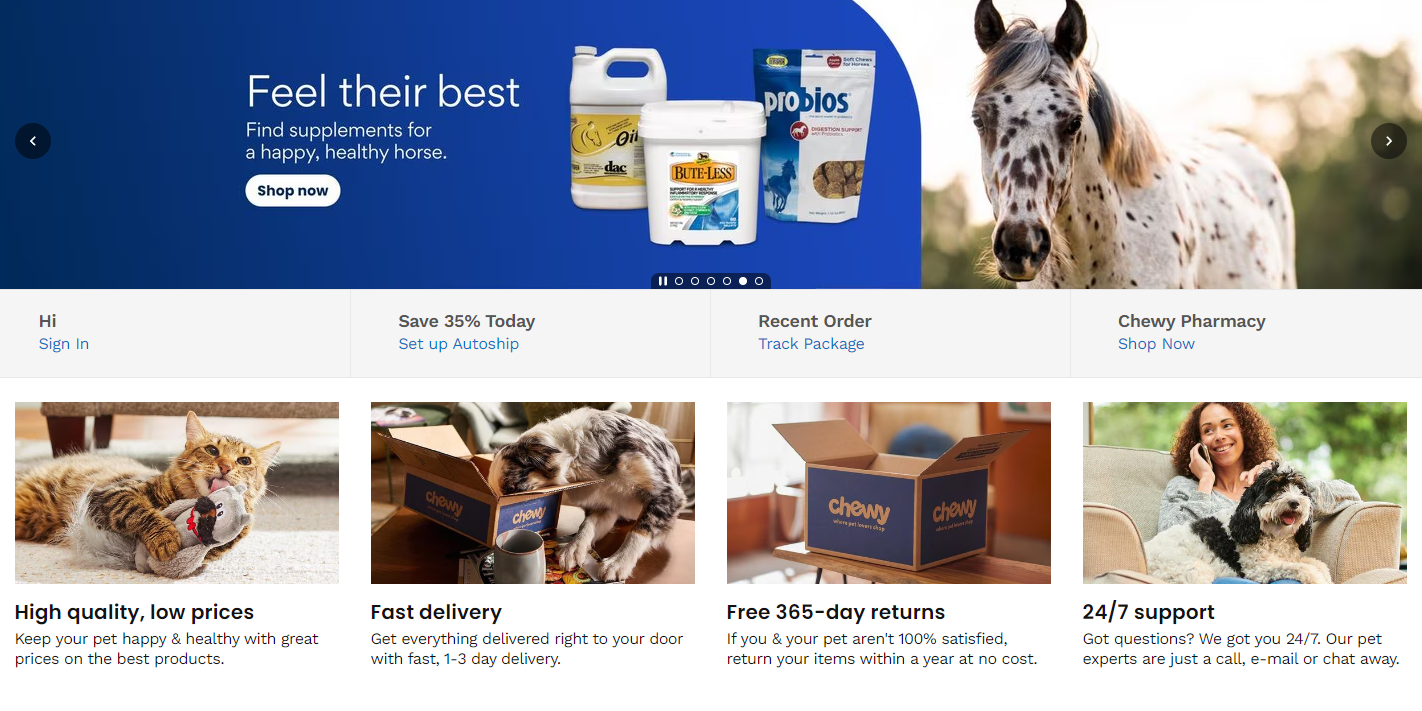
Subscription businesses have revolutionized countless niches, and Chewy is one of the best examples given that it had to take on Amazon and win in order to do so. Many companies have tried and failed, but Chewy’s niche offering–high-value products delivered quickly and conveniently plus incredible personalized service–got the job done.
Founded originally in 2011 as Mr. Chewy by now-GameStop CEO Ryan Cohen, Chewy was so successful in how it took on the pet food niche that it was acquired for over $3 billion by PetSmart after just six years in operation, a then-record for the largest ever acquisition of an ecommerce business. Chewy’s sales are now well over $11 billion with 10%+ growth YOY, and the company has even expanded into veterinary care as it expands across more pet-related niches.
Why it Works: Chewy understood the needs and attitudes of pet owners right from day one, and allowed consumers to automate the purchase and delivery of pet food and supplies rather than having to take care of it themselves regularly with their groceries. Plus, the assurance of quality without being disproportionately expensive makes Chewy an extremely easy sell.
2. Volvo Trucks (niche market: precision-engineered trucks)

The image above is a still from a video you’ve probably seen. It’s an example of viral advertising at its very best, and if worldwide fame wasn’t enough, the commercial (known as The Epic Split) took home multiple gongs at Cannes. Volvo Trucks adopted advertising genius to win over their niche, showcasing precision steering and rising to the top echelon of trucking—they’re currently second in terms of market share, and currently employ over 50,000 people.
Why It Works: Volvo Trucks have been around since prior to the second world war but only became a separate company in 2016. As such, they’ve been able to build a modern approach toward marketing, and are able to perfectly capture the attention of their niche customers via intelligent (and, in the case of The Epic Split, bombastic) advertising.
3. Throx (niche market: socks for younger consumers)
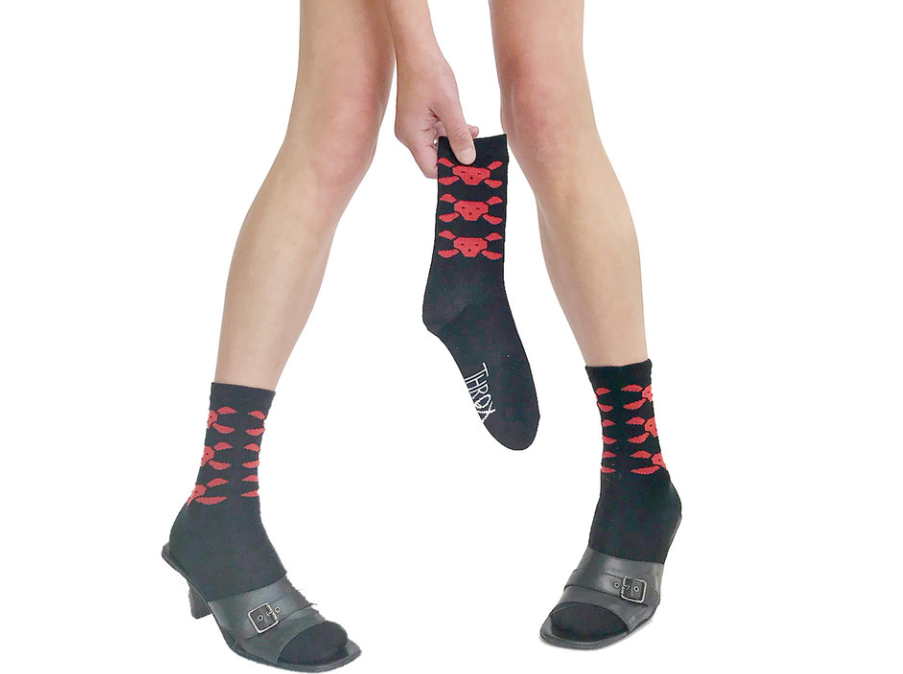
Throx, which ardent television viewers might remember from episode 108 of Shark Tank, is the brainchild of Edwin Heaven. Heaven was shot down by the Sharks, but Throx very much exists, giving website visitors the opportunity to pick up not pairs of socks, but sets of three. Throx is especially popular among teens and pre-teens, and has seen plenty of success despite failing on reality TV—the company was up to $1 million in annual revenue according to a 2021 report and is still going strong.
Why It Works: It’s the cure for the missing sock, of course! Almost everyone loses a sock here or there, and by buying a spare, there’s always a pair at the ready when you need it the most. It’s a fun but rather clever niche, and sold with creativity by founder Edwin Heaven.
- Lucrative niche market examples for business
- Dropshipping niches for launching winning products
- Best niches for affiliate marketing
4. Blackbaud (niche market: software for non-profits)

More serious but no less clever, Blackbaud is a cloud computing provider that focuses largely on the non-profit niche. Founded back in 1981 by Anthony Bakker and headquartered in South Carolina, the company’s flagship offering is its fundraising SQL database software called Raiser’s Edge. It’s got a legacy that reaches all the way back to the company’s beginnings, and is based on their original student billing product first developed by Bakker for their first client, the Nightingale-Bamford School in Manhattan.
Why It Works: The non-profit, fundraising, and educational niche that Blackbaud focuses on has often been underappreciated by service providers, but it remains an extremely important–and profitable–niche if served effectively. Blackbaud has done so successfully, earning over a billion dollars in annual revenue.
5. CD Projekt (niche market: retro games for older gamers)

CD Projekt could well be on this list several times over, and they’re best known for their Red studio’s The Witcher series of games that were undisputed hits and, in the case of the third installment The Witcher 3: Wild Hunt, in the running for the crown of best video game ever made. The Witcher series was itself a niche product at conception, mixing Eastern European fantasy with a mature approach to storytelling (although there was significant censorship in the US version of the first game given the comparatively conservative nature of the US audience).
However, CD Projekt’s founders Marcin Iwinsky and Michal Kicinsky were video game retailers before they founded the company, and this background shows in CD Projekt’s decision to found GOG.com. Good Old Games is a video game distribution service that helps players to find old games and run them on newer machines, free of digital rights management issues.
Why It Works: Reminiscence is an extremely powerful psychological factor, and the emergence of Roguelike, Platformer, and other types of older game in the video game market reflects the desire of increasingly older gamers to return to their youth. GOG delivers a way to actually buy and play those older games, bringing them back to life—in many cases literally thanks to defunct developers and incompatibilities of old code with modern platforms.
6. Under Armour (niche market: base layers for athletes inconvenienced by sweat-soaked clothing)

Under Armour is recognized worldwide today, but back in 1996, it was just an idea being formed in a Washington, D.C. basement. Then a 24 year old fullback on the University of Maryland football team, Plank observed that the t-shirts he wore under his jersey for practice would get soaked with sweat while his compression shorts stayed dry. This led him to make a t-shirt out of synthetic fabric that would wick moisture away.
Why It Works: The inconvenience of changing out of sweat-soaked shirts was a pain point that Plank was able to solve in an iconic manner, and his Under Armour brand went mainstream after Oakland Raiders quarterback Jeff George was pictured wearing it.
7. Glorious Gaming (niche market: custom PC peripherals for PC builders)
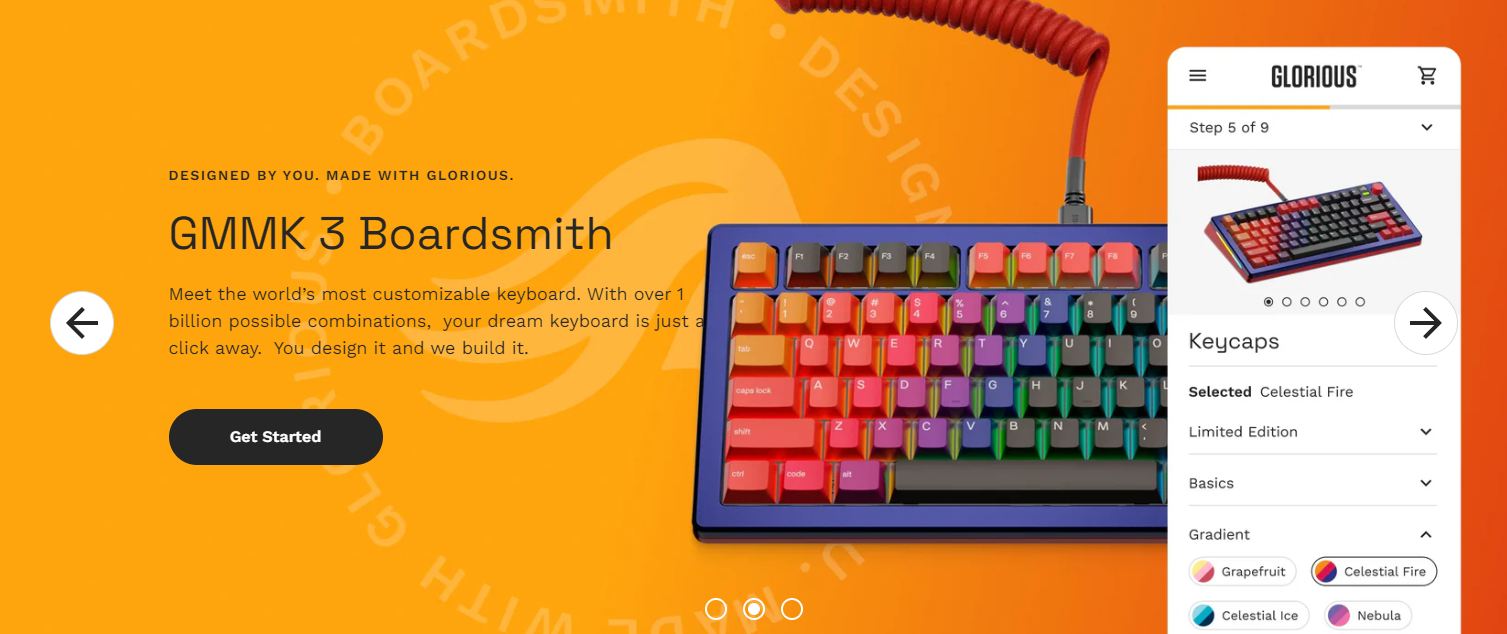
We mentioned The Witcher previously, and in a review for it back in 2008, writer Ben “Yahtzee” Croshaw employed the term “Glorious PC Gaming Master Race” to poke fun at the elitist attitude he observed among some of the game’s PC player base. The term has since become a major internet meme and is used tongue-in-cheek within gamer culture to differentiate PC gamers from their console counterparts.
One of the defining traits among PC gamers is the pride they take in their PC builds, and Glorious were quick to hop onto the meme and establish a brand that caters to exactly that, proving all sorts of custom PC peripherals and accessories that go with (or become the centerpieces of) even the most outlandish of custom PC builds.
Why It Works: PC builders are a niche market but one a handful of brands are very happy to cater to. Glorious was able to identify that keyboards especially were a huge opportunity to really make a name in this area, and cleverly adopted the most central meme to their target market.
8. Diapers.com (niche market: convenient diaper ordering and delivery for parents of infants and toddlers)

Diapers.com, originally known as 1800Diapers when it was founded in 2005, did exactly what it said on the tin—they sold baby products, including diapers. A specialty retailer which automated fulfillment as much as possible at the time, Diapers.com made $2.5 million in diapers and formula in its first year before beginning to grow exponentially. The company did so well in their niche that Amazon reportedly had to resort to a price war in order to compete, being accused of predatory pricing before finally acquiring the company for $545 million in 2010. It operated independently and followed an integration model until 2017, when Amazon shut the side down claiming lack of profitability.
Why It Works: Diapers.com didn’t innovate quite as much as Chewy, but you can probably see the similarities and opportunities within both niches. Parents of infants are an especially interesting niche given how time-strapped they are and thus willing to consider alternatives that would make life a little easier.
9. Nomatic (niche market: luggage for digital nomads)
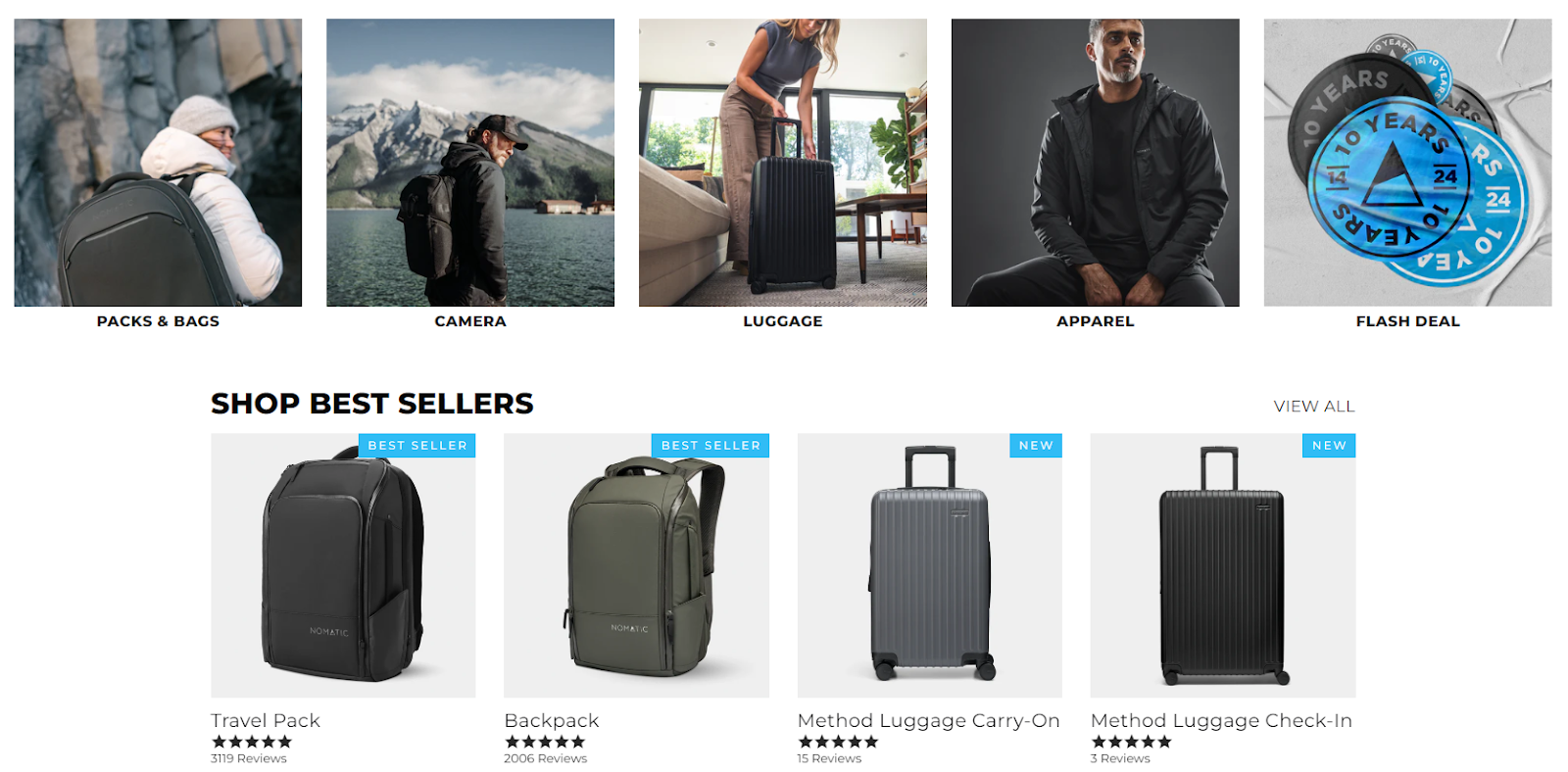
Nomatic is a brand that focuses on digital nomads, capitalizing on the advance of technology to the point where there’s really no need to be stuck in an office anymore for the vast variety of workers. Many jobs can be done fully remote, and while plenty of people prefer the comfort of their own home, others travel and work from wherever they happen to be at the time. Nomatic enables this lifestyle by selling purpose-built suitcases, backpacks, cameras, and apparel.
Why It Works: Nomatic is all about its traveler and digital nomad niche, but like a few other brands, you might not really see the difference between their products and other similar ones. That’s because a lot of it is in the marketing, and Nomatic has a great track record of really communicating with and building the trust of their target market through everything they put out.
10. Lush (niche market: ethical cosmetics for consumers with a conscience)

Lush is a cosmetic brand that makes fairly standard products but packages them in as eco-friendly manner as possible and makes them, wherever possible, with eco-friendly products. The entire Lush business model revolves around ethics and transparency, and they’ve been doing it for a long time—in fact, long before most of their competitors decided to hop on the bandwagon thanks to the rise in ecological awareness among consumers.
Why It Works: Lush were able to identify very early on that there was a niche of consumers who genuinely cared about the environment, and they got ahead of the trend by starting with this small group of core consumers.
11. L.A.B. Golf (niche market: premium putters for golfers prepared to pay for top quality)
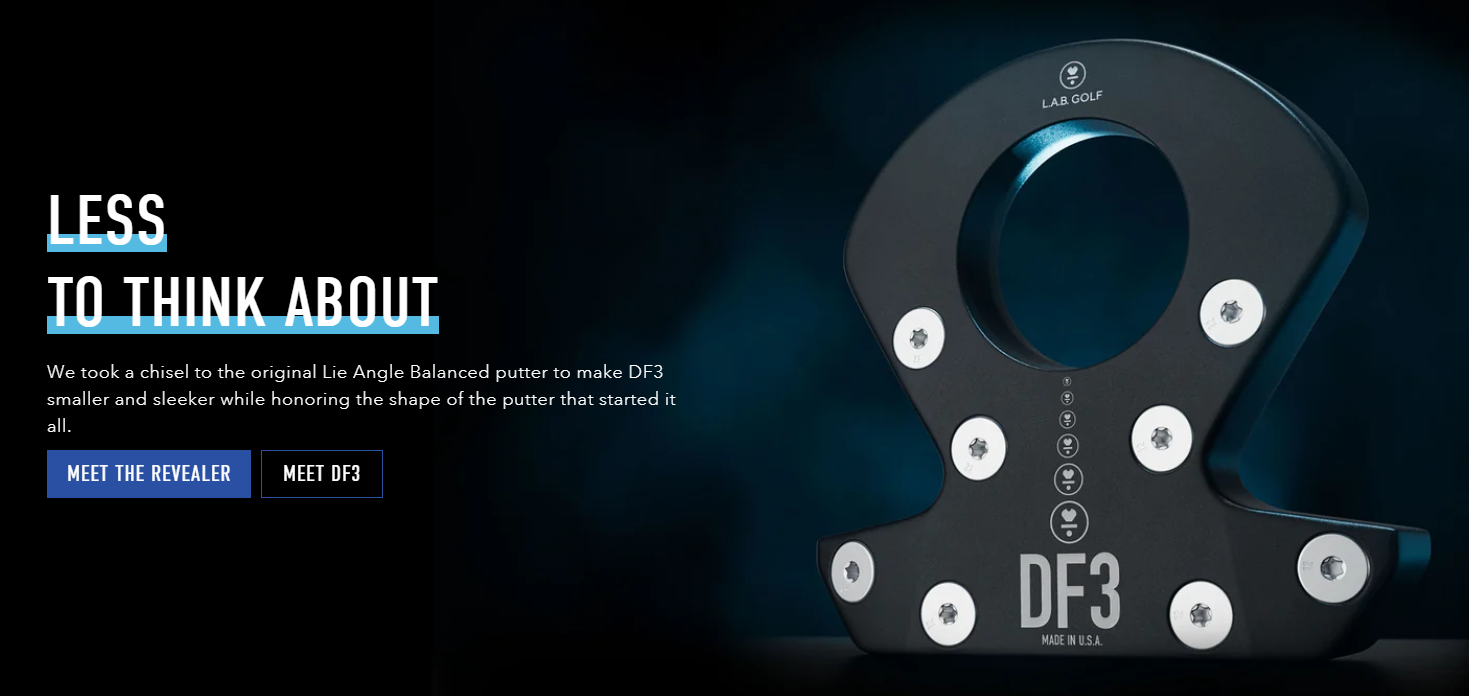
Winston Churchill once described golf as “a game whose aim is to hit a very small ball into an even smaller hole, with weapons singularly ill-designed for the purpose”. Well, L.A.B. stands for Lie Angle Balance, a patented technology that aims to help golfers on the green by reducing torque during the putting stroke and giving them the best possible chance of hitting the ball exactly where they aim it (which, as Churchill might have added back in the day, remains quite a challenge). L.A.B. also customize the putters they sell precisely to the customer’s individual putting technique, building on the benefits provided by their tech.
Why It Works: Golf equipment is a narrow niche in itself, and drilling down to putters and then premium putters shows that a really specific niche can still spawn a very successful business—especially when you bring something new to the table. Previously, the premium putter market was dominated by designer products, but L.A.B. are operating on a more technology-focused platform.
12. Spektrum Glasses (niche market: blue light reducing glasses for people who have a lot of screen time)

Ever done a bit of catching up on social media before finally turning your phone off and trying to get to sleep? Screen time doesn’t really help when it comes to falling asleep fast or getting good sleep, largely due to blue light—and yet, even though many people know this today, it doesn’t stop us from trying to transition directly from screen to sleep.
Spektrum was founded by “two guys who just couldn’t get off their computers” in order to protect people like them from the harmful effects of blue light that we’re all exposed to everyday—just as you probably are right now, reading this.
Why It Works: Screen time is something everyone has these days in increasing quantities, with the US daily screen time average now sitting at around 7 hours… just for computers. Add in smartphones, and that number goes up even more. This is a trend that’s not going away, and it’s a smart niche to get into.
13. Fitbunch (niche market: fitness coaching for amputees)

The fitness industry is massive, and Fitbunch operates in a small but extremely uplifting niche by coaching amputees who want to rehabilitate their bodies and minds through fitness. Fitbunch founder Trevor Bunch is an amputee himself, and helps others just as he has helped himself in overcoming the limitations of their new bodies, reclaiming their independence and making the most out of their “new normal”.
Why It Works: Many of the examples on this list highlight the opportunities people have to create businesses solving their own problems—there are always others out there just like you, which implies the existence of a niche. It really helps when you’re making people’s lives better through your work, too!
14. Lefty’s (niche market: supplies n’ stuff for left-handers)
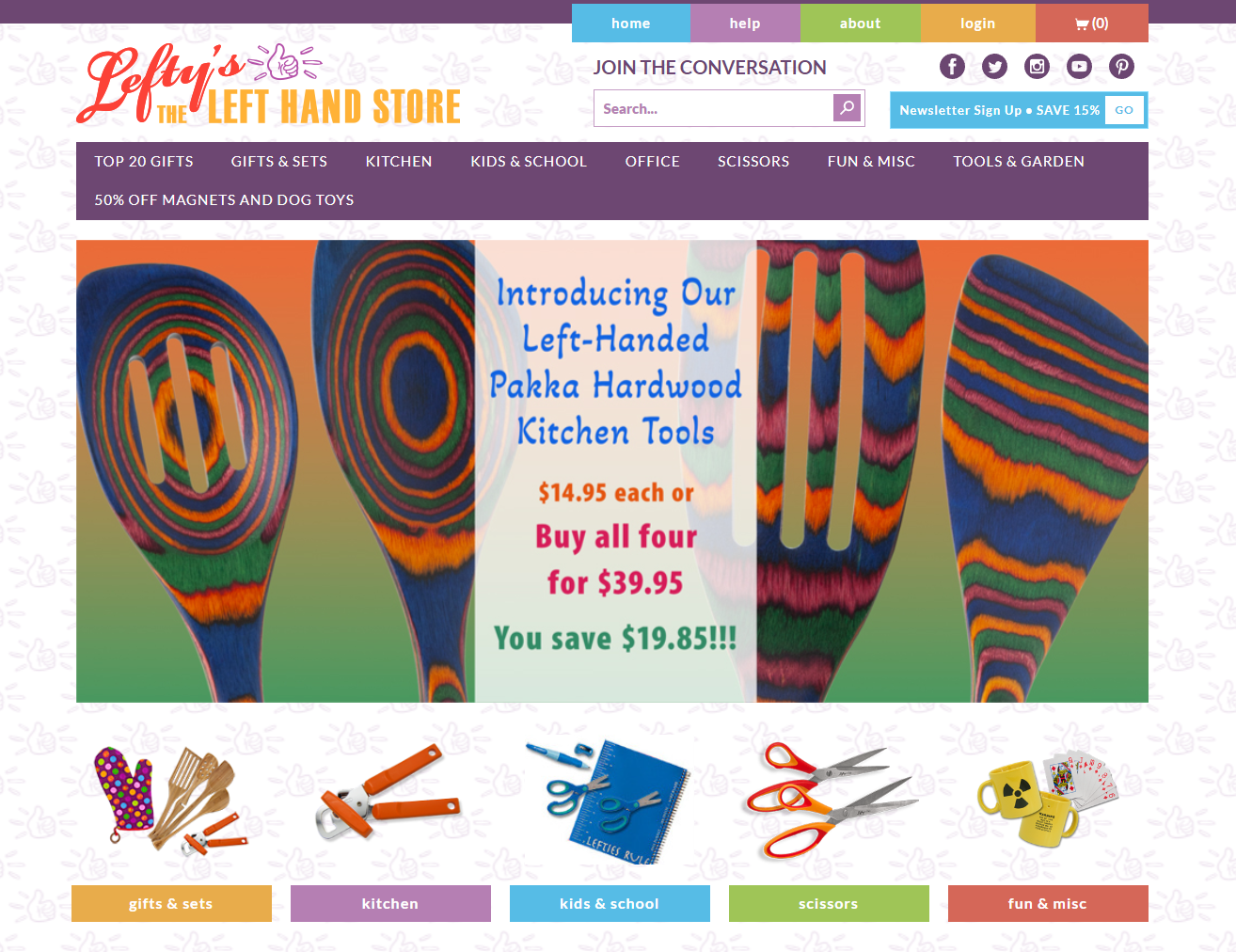
It’s estimated that around 10-12% of the total world’s population are left handed, making it something of a niche market by definition. San Francisco-based Lefty’s has gone all-in on the niche by selling all sorts of stuff for left-handers—whether it’s school supplies, gardening tools, or even gift sets, Lefty’s has got something for the lefty in your life.
Why It Works: Lefty’s has a very defined target market and, like other more traditional businesses on this list, utilizes digital media and new advertising techniques very well. PPC is one of their main channels, and it’s a good example of how a smaller business can compete with even the largest retailers within a niche market.
15. The Pink Moon (niche market: stylish and affordable plus size clothing)

The Pink Moon is an Indian clothing brand that offers high-quality, reasonably priced garments in sizes ranging from large to 6XL, filling the need for stylish and affordable clothing in plus sizes. They also provide above-and-beyond customer service, going so far as to contact customers following order placements to confirm measurements and preferences—that personal touch is in keeping with the brand’s supportive attitude.
Why It Works: The Pink Moon knows its niche and maintains a supportive, uplifting community that’s focused on body positivity and self-love, and their design principles demonstrate a fundamental understanding of their customers—every elastic, button, and placket is chosen to ensure the right behavior of clothing in terms of fit, sizing, and usage.
16. Bonobos (niche market: perfectly fit online pants (and now clothes) store for men)

As we’ve proven with a lot of these niche business ideas, you don’t always need to do expensive or extensive market research to figure out a viable business idea—often, it’s just a matter of identifying your own problems or those of your peers. Andy Dunn and Brian Spaly did just that, realizing that their pals at Stanford business school always seemed to struggle with the fit of their store-bought slacks. Hence Bonobos, which came out swinging for the fences with men’s pants, hitting a cool $1 million in revenue in just six months.
Why It Works: Bonobos is another one of those brands that really speaks to its target market through its marketing and communications strategies, and the niche is a good one—fitting used to be a question of visiting a tailor and getting measured, but Bonobo was able to get that perfect fit for customers despite being an online store.
17. Powell’s City of Books (niche market: print literature)

Established all the way back in 1971, Powell’s might be familiar if you’re from anywhere near the Portland area—it spans an entire city block, and is considered the world’s largest independent bookstore. With a truly impressive selection of books covering every imaginable genre or category, Powell’s is very much a print business but makes itself part of the digital conversation when it comes to literature, engaging and contributing to discourse on a wide variety of channels and using hashtags for promotions and giveaways.
Why It Works: Print bookstores have struggled in the last two or three decades thanks to the emergence of online shopping, and Amazon especially has been a major contributor to this. Powell’s have not only held firm, they’ve moved with the times, primarily by engaging their niche through digital channels while retaining their traditional business model—although that’s been updated too since they have warehouses and book sources all over the US.
18. Lehman’s (niche market: the Amish)

Lehman’s started out as a small hardware store serving the local Amish population in Kidron, Ohio, but has since grown into a store that transports the visitor back in time—it’s made up of pre-Civil War buildings and sells old-fashioned food and beverage as well as a variety of non-electric goods aimed at its original niche. The full shopping experience is actually a quarter-mile long, and while it’s all about the past and stocks a tremendous collection of antiques and products from a bygone time, you can check out the store from anywhere in the world with a virtual visit.
Why It Works: Lehman’s has moved on from its original niche, but has carved itself a new one today with the experience it provides visitors, giving them a look at the past—it’s worth a visit just to grab yourself some food and drinks that you just can’t find anywhere else.
19. Brevo (niche market: relationship marketing originally in French)

Founded under the name Sendinblue in 2012, Brevo is a software that originally allowed users to create email newsletters and transactional emails in French. It now provides a full cloud-based communications software suite, with marketing automation, CRM, landing pages, SMS marketing, and retargeting ads all part of the package offered in English, Spanish, Portuguese, Italian, and German.
Why It Works: Sendinblue was ahead of its time with its niche, and targeted the French market which was then unserved in terms of email marketing. It used to garner mentions in the same breath as now-household names such as Giphy and Patreon at the time among startups to keep an eye on.
20. Razer (niche market: console controller attachment for mobile gamers)

Razer is a very well known name in the world of PC building and gaming, but a quick peek at any research report on gaming will highlight the size of the mobile gaming market. While a lot of mobile games are quite simple and low-fi compared to what’s available on PCs and consoles, lots of people play mobile games for hours on end, flipping their phones over and holding them like a console controller. So, why not go the extra mile?
Why It Works: Mobile phones are getting more powerful with every iteration, and the Razer Kishi is ahead of the game in that it creates a more comfortable experience for gamers who are really into their gaming on the go. Again, this looks like a trend that’s not going anywhere.
How to find a niche for your business
We’ve given you a quick peek at twenty different niche businesses that all found success in their own way, and while several were able to identify their niche by simply observing the pains and problems of the people around them (and even themselves) you don’t really need to be a visionary founder to find a niche for your own business given the tools and technology available today.
Research the market
The first thing to do when trying to identify a niche is to try and identify what the world is talking about. Google is probably the best springboard for this, and just tossing potential business ideas into your Google search bar might throw some interesting starting points at you. For example, take a dip into this list of business ideas, and Google one of them. In this example, we’ll use podcasting, and pair that with a broader activity like, say, cooking.

Looks like people are looking for a variety of things related to cooking podcasts, but there’s already a couple of niches. Creating a cooking podcast and marketing it as being free looks like a good bet, and if you think you can hit the UK or Australia market for a pod, you might be in luck.

Google Trends, pictured above, is another excellent starting point. We’ve not even entered any search terms yet, and Google is already giving us trend information based on location—and as the image shows, people in the US are searching for information about the Bank of America.
The Bank of America is currently (as of Oct. 2nd) experienced widespread outage, with some users stating that they cannot see their balance, and others reporting that their balances are showing as zero. If you were in the business of sharing information online you could set about answering these deep questions and shining a little more light into the darkness by sharing user stories. YouTube channels, niche blogs, ebooks—there are lots of different ways you could create your own content here.
Explore your ideas
Once you’ve got a few ideas shortlisted following your time in Trends and Search researching different markets and areas of interest, you can use a technique like a mind map to further visualize things and spark your brain for inspiration.
Just putting your ideas down on paper (or a whiteboard, or an electronic mind map) can help you to flesh them out a little further, and examine different possibilities in more detail. It’s a good idea to use a specialized software or a notebook for this, because you can save your progress and come back later to add to it as more thoughts strike you—sometimes all it takes is a shower or a quick walk to spur the imagination.
Your central idea should be in the middle—so that’s where you’ll write “cooking podcast” or “history YouTube” or whatever it is you’ve come up with. Then you can start branching off with some of the other angles you’ve found, such as the UK and Australia or the Bank of America issues respectively.
Do keyword research
Next, you’re going to want to take whatever niches you’ve been looking at and plug them into the Google Keyword Planner. This tool allows you to do more basic research by finding new keywords, but also lets you look at how often people search for certain terms.
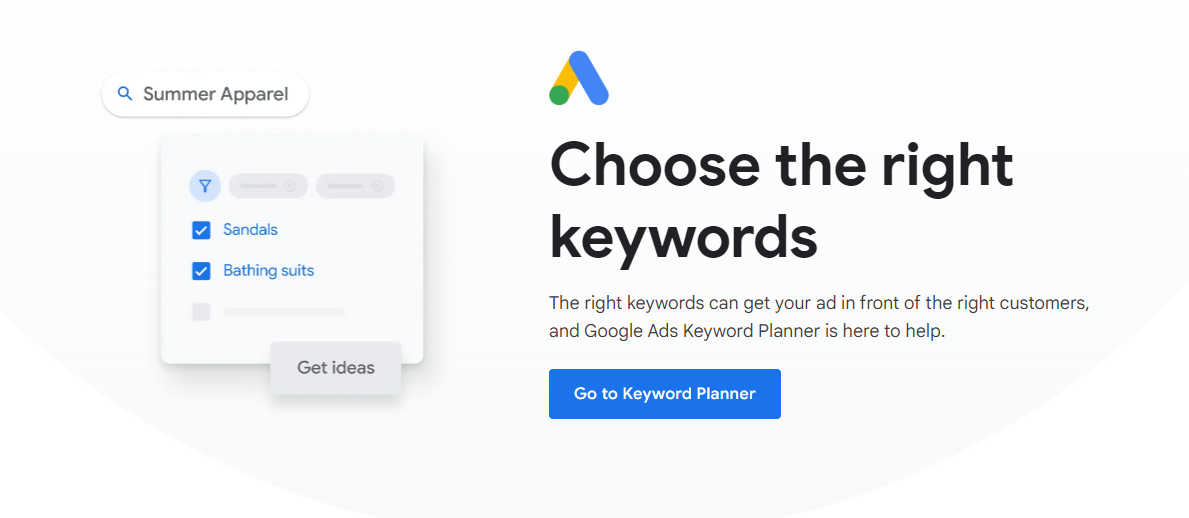
There are other tools out there worth considering such as serped.net and AlsoAsked, although you’ll have to keep an eye out on the pricing plans offered by the different platforms out there—you might get free trials or introductory deals that allow you to test out the tool fully and even get all of your research done within that time.
Ultimately, the point is to find a niche within your area of interest where there’s a fair level of search activity but also low competition. A lot of the businesses we looked at earlier were able to do well because they jumped into niches that weren't just underserved but completely unserved.
Understand your niche
Now that you’ve hopefully decided on a niche to pursue, it’s time to dive as deep as you can into that niche in order to understand whatever competition there is as well as the consumers themselves. As we detailed previously, a lot of niche businesses solve problems that people have—so you’ll need to figure out how you can listen to your target consumers.

One option is Reddit, the uber-popular site that essentially has forums for just about every possible topic. With a little creative searching and diving through relevant subreddits, you’ll swiftly start to understand the questions people have as well as their opinions and experiences.
Once you’ve figured out the big issues among your target audience, you can start to tailor your business to them with confidence.
Ask your audience
This won’t apply to everyone, but if you already have an audience or some sort of online community of your own, consult them! Not every community member will engage, but the most invested ones will definitely give you their input as to the different issues that they face. The big bonus of using your own audience is that you’ve already developed an element of trust and rapport with them, so conversations can happen much more easily.
Even if it isn’t strictly an audience, don’t neglect your peer group. Our example of Bonobos above showed how a couple of entrepreneurs were able to launch a six-figure business just by understanding a problem that their classmates had. There’s no reason you shouldn’t be able to do the same in your own chosen ecommerce niche.
Ready to launch your business?
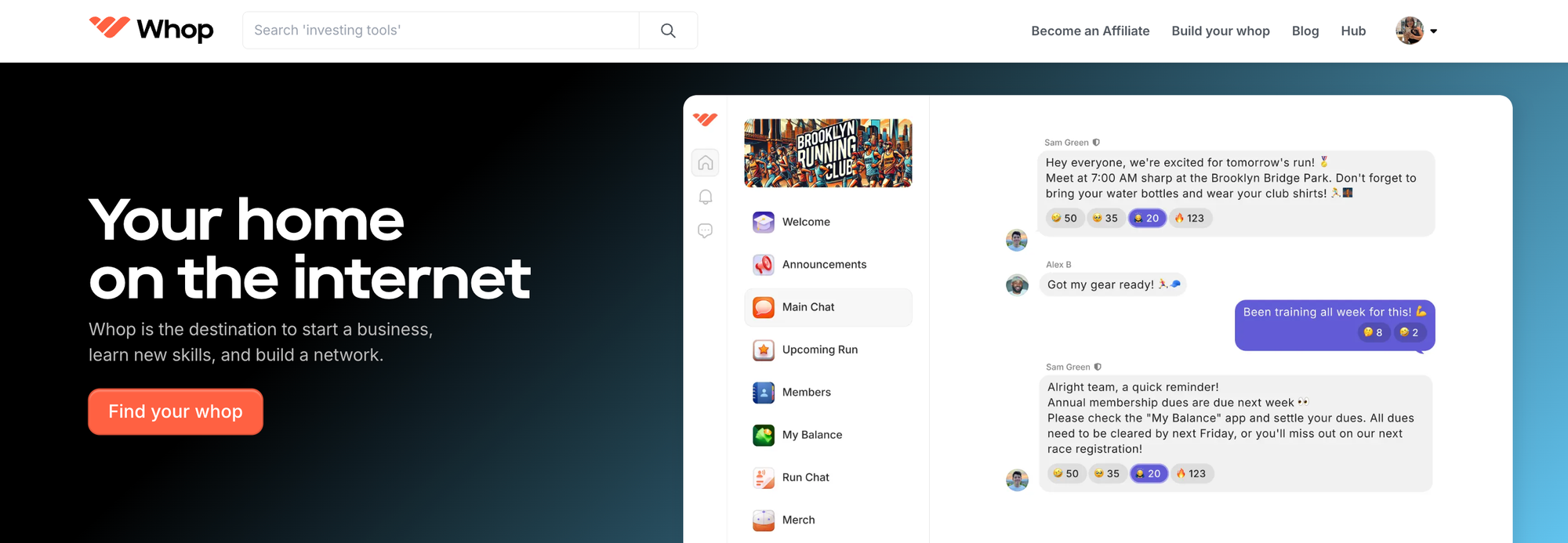
We’re not going to go into full depth on how to launch a business here, but if you’ve settled on your niche and know your consumers and what problems you can solve for them, you’re good to go. Now it’s all about coming up with a business plan and then just committing to it and launching your new venture.
When you’re ready to go, the best thing you can do for yourself is to find a top ecommerce platform to launch your business on. If your product’s digital, look no further than Whop.
It’ll only take a moment to sign up, and then you can get started building out the different elements of your business by just dragging and dropping them into place—whop hubs are really easy to use, and you can have a brand new online store up and running in a matter of minutes if you’ve got your branding imagery and sales copy ready to go.
So, if you want to start an online business selling your digital products quickly and with a minimum of fuss, check out Whop and sign up for free today.



